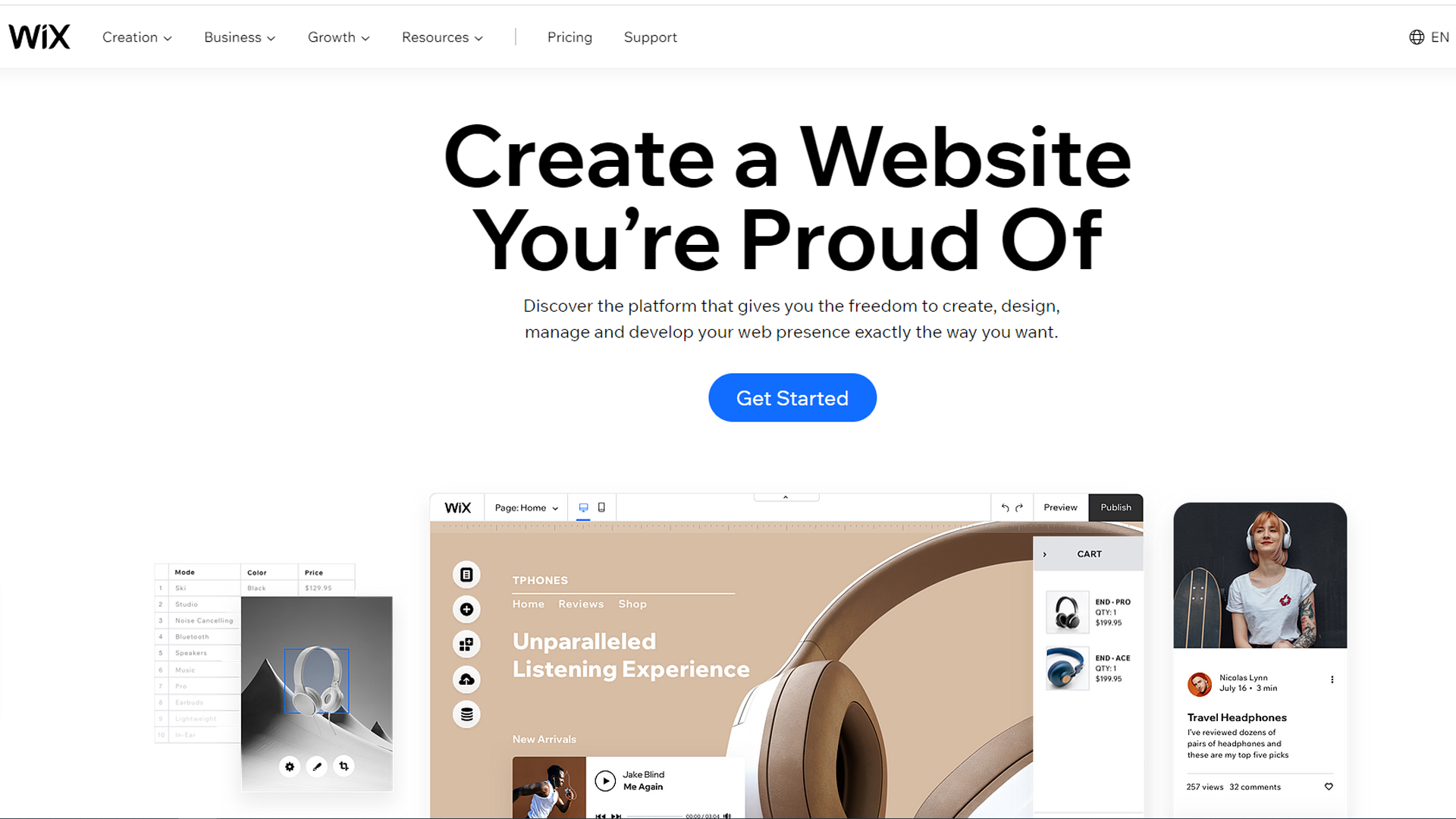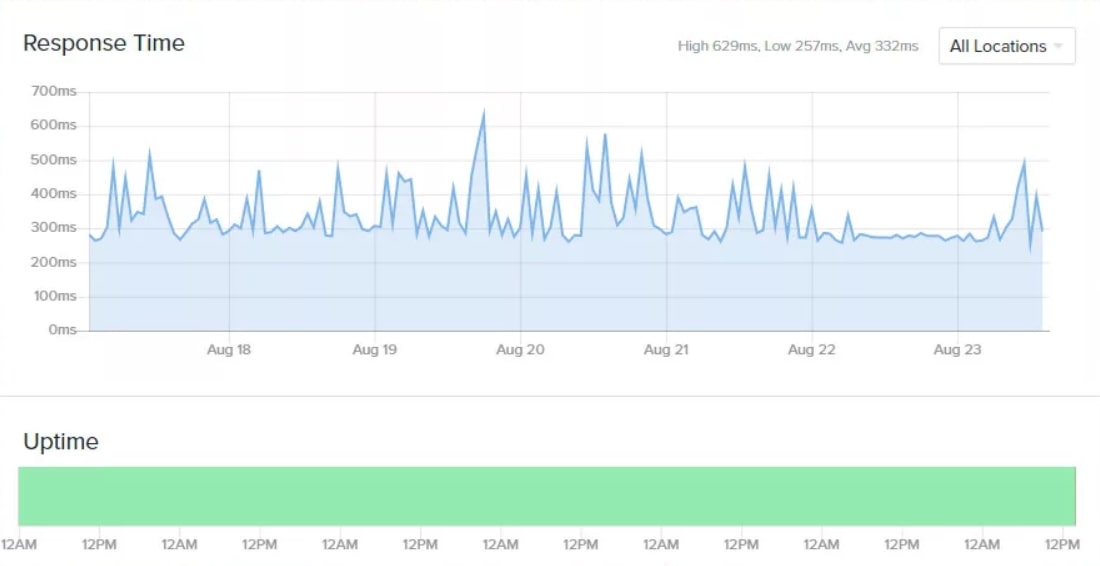9 tips for buying a web hosting service
Find the right web hosting service for your website

Choosing the best web hosting service for your website can be difficult if you're new to the market, and don't know much about it. With hosting providers happy to utilize technical hosting jargon to make their services sound better than they actually might be, you can easily be distracted from the important features that are lacking.
As such, you might be struggling to find the top web hosting service for your site: so what should you really be looking for? In this article, we've listed nine hosting features that you need to look for and bear in mind before you commit to a web hosting platform.
1. Website builder

More and more hosting providers are offering built-in tools to help you create a beautiful website that compete with or rank alongside the best website builders. If you’re creating a site for the first time, or want to get your content in front of visitors as quickly as possible, this can be a huge advantage.
That said, the quality of these website builders can vary a lot. Some hosts’ website builders come with hundreds of themes and drag-and-drop functionality, while others limit you to essentially customizing a pre-built template.
Also, keep in mind that dedicated website builders like Wix and Weebly include hosting, but they’re not traditional web hosts. You won’t be able to transfer a Wix site to another host in the future, for example.
2. Solid state drives
Hosts that provide solid state drives (SSDs) as opposed to traditional hard disk drives (HDDs) tend to be more expensive. But in our view, the added cost is well worth it.
SSDs have fewer moving parts, so they’re less likely to break and leave your site offline for hours at a time. The data transfer rate can also be significantly faster compared to HDDs, which means faster page loading for your visitors. Faster page loading in turn can help boost your site in search engine rankings and increase your customer conversions if you’re running an online store.
Sign up to get the BEST of Tom's Guide direct to your inbox.
Get instant access to breaking news, the hottest reviews, great deals and helpful tips.
3. Bandwidth

Your bandwidth for web hosting is the amount of visitor traffic and data allowed to flow to and from your site. If you only have a few thousand visitors to your website per month, you probably don’t need to worry much about bandwidth—most hosts provide more than you’ll need with their cheapest options.
But, if you have a lot of videos or a lot of data to load, like videos or high-res images, bandwidth can become very important. Make sure your hosting company enables you to scale your bandwidth allowance if needed. Hosts that don’t offer much bandwidth, even with their top-tier plans, probably don’t have a great network.
4. Storage
Unless you have a large website with a lot of photos and videos, storage is unlikely to be an issue. Most hosting plans come with either hundreds of gigabytes of storage, or place no limits on your storage at all.
But, keep in mind that unlimited storage doesn’t mean you can use your host as a storage service for data that has nothing to do with your website. Most hosting plans have limitations on what you can store and how you can store it. If you need somewhere to put your business’s files, consider a cloud storage service like Google Drive or Dropbox.
5. Scalability

Scalability is one of the most important things you need to consider when choosing a web hosting service.
To start, your host needs to be able to help you quickly pivot if your website sees a spike in traffic. After all, what’s the benefit of a successful marketing campaign or a viral video if your website crashes from all the new attention? Ideally, your web hosting service will have the ability to move you from shared hosting to virtual private server (VPS) hosting without taking your website offline.
Over the long term, you also need the ability to scale your web hosting service with your business. Most companies aim to grow their web traffic over time, so that plan you choose today might not be suitable for the amount of traffic your website is receiving in two years’ time.
Make sure that your web hosting service makes it easy to upgrade your plan on demand, including to VPS hosting, without any downtime.
6. Access
Most web hosting services include a control panel that enables you to manage your files and account settings. While many use the cPanel software for this purpose, some hosts have their own proprietary control panels. Ensure it’s easy to use and includes tools for customizing your website’s security and file structure.
You’ll also want to be sure you have FTP (file transfer protocol) access to your website. This is a simple method for moving files to and from your web hosting service. Ideally, the maximum file size for transfers will be far larger than any of your media files. Also, look for a web-based file manager that you can use to upload content on the go from your mobile devices.
7. Support

While you might hope to never need to call your host for help, it’s critical that there’s a knowledgeable technician on the other end of the line when you do. If your website goes offline, for example, you don’t want to be left on hold or given the run-around while you’re losing traffic and sales. Most top hosting services provide 24/7 phone and live chat support for exactly this reason.
It’s also important to check whether your host guarantees your website’s uptime. Be careful to read the fine print here. Some hosts claim a 99% uptime, which means your website could still be down for more than three days per year. A 99.99% uptime, though, means you’ll experience less than one hour of lost traffic.
In addition, some web hosting services will pay you for every hour your website is down, while others won’t lift a finger to make the situation right.
8. Location
Another thing to consider when choosing a web host is where that host’s data centers are located. Ideally, your host’s servers should be as close geographically as possible—within the same country or city—to your website’s audience. The less distance the data has to travel, the faster your pages will load.
Many web hosting services will also include a CDN (content delivery network) like Cloudflare as part of your hosting package. This is helpful if you have a global audience, since a CDN creates cached copies of your website and stores them on servers around the world. That speeds up your visitors’ experience, no matter where they are relative to your host.
9. Backup

Backups are an often overlooked feature that only a handful of hosts provide. With automatic backups, your hosting provider will create a copy of your website and content database at regular intervals, and store it on another server.
If anything happens to your website, such as a failed server, a hack, or a fire at the data center, you can easily restore your site from the backup. If you don’t have backups included in your hosting plan, you should make your own copies of your website.
Download the HTML behind your pages as well as your site’s database through the host’s control panel. Then store these files on an external hard drive or in a cloud storage space. Make sure you create updated backups at least once per month to be prepared for unexpected data loss.
Further reading on web hosting and website builders
Read our guide outlining how to choose a web hosting service for more information; and five common mistakes to avoid when choosing a web hosting provider. We also compared web hosting vs WordPress vs website builders, so you can establish what similarities and differences these elements share.
Michael Graw is a freelance journalist and photographer based in Bellingham, Washington. His interests span a wide range from business technology to finance to creative media, with a focus on new technology and emerging trends. Michael's work has been published in TechRadar, Tom's Guide, Business Insider, Fast Company, Salon, and Harvard Business Review.
-
CarolCarol ReplySSDs have fewer moving parts, so they’re less likely to break.
Huh? Fewer???? Why is this site always loaded with errors?????

